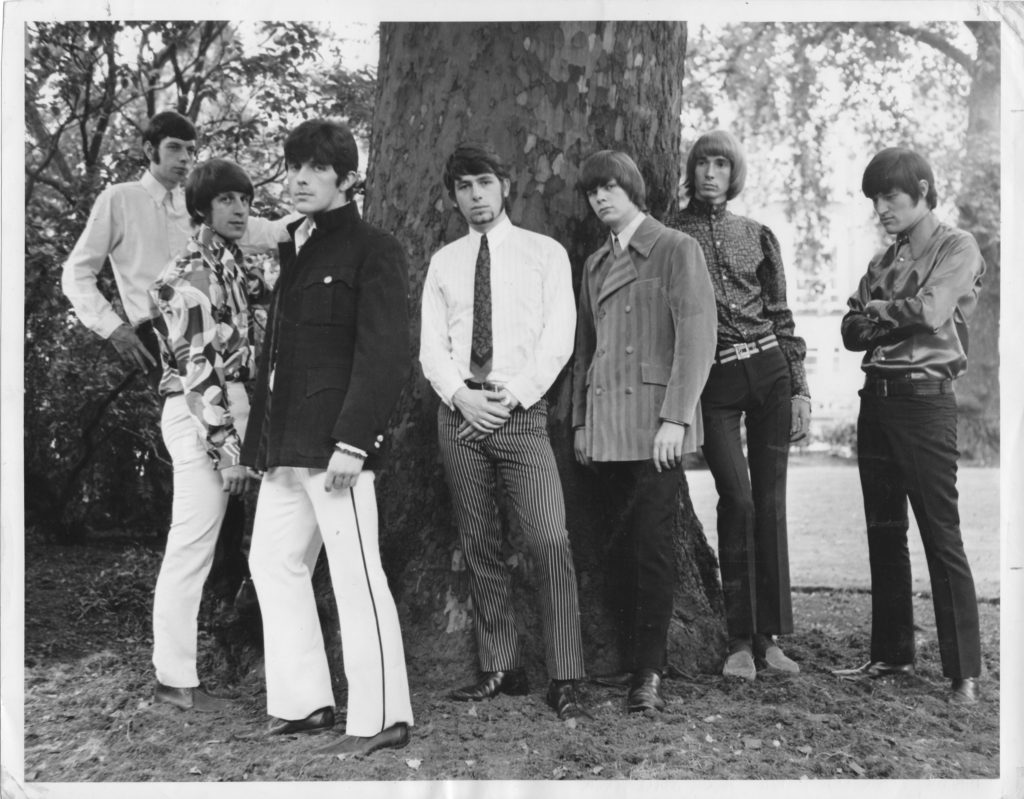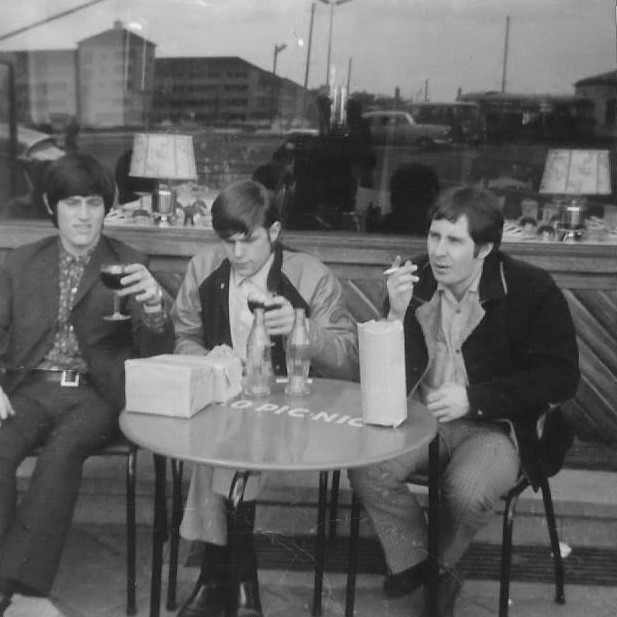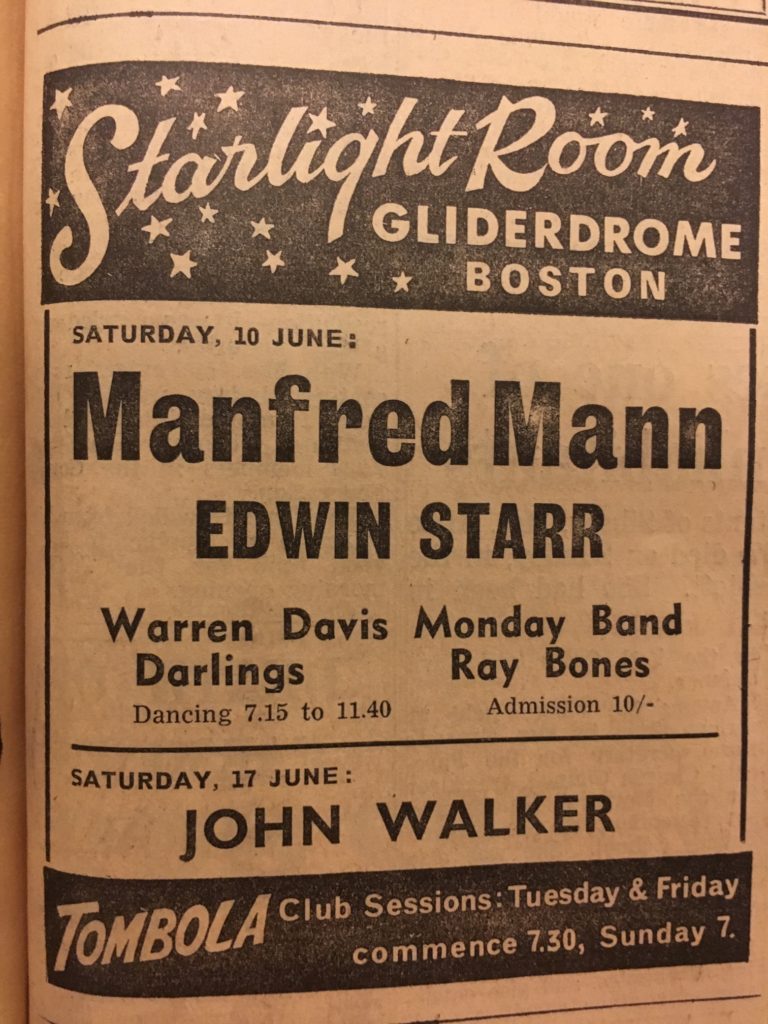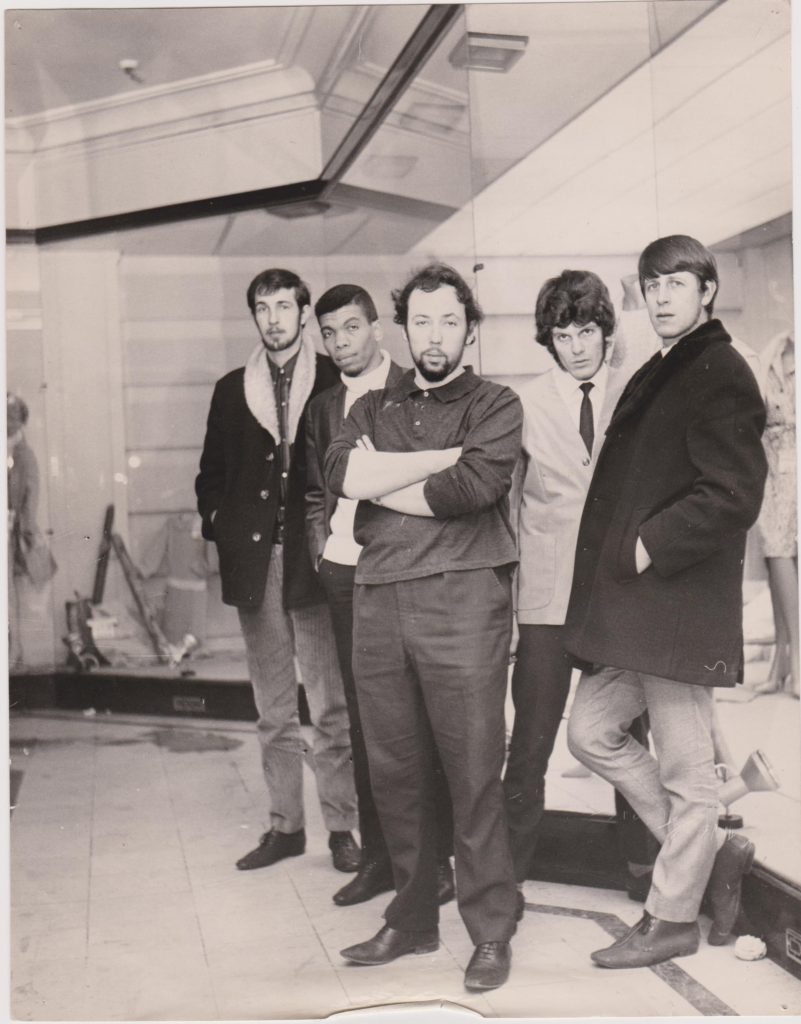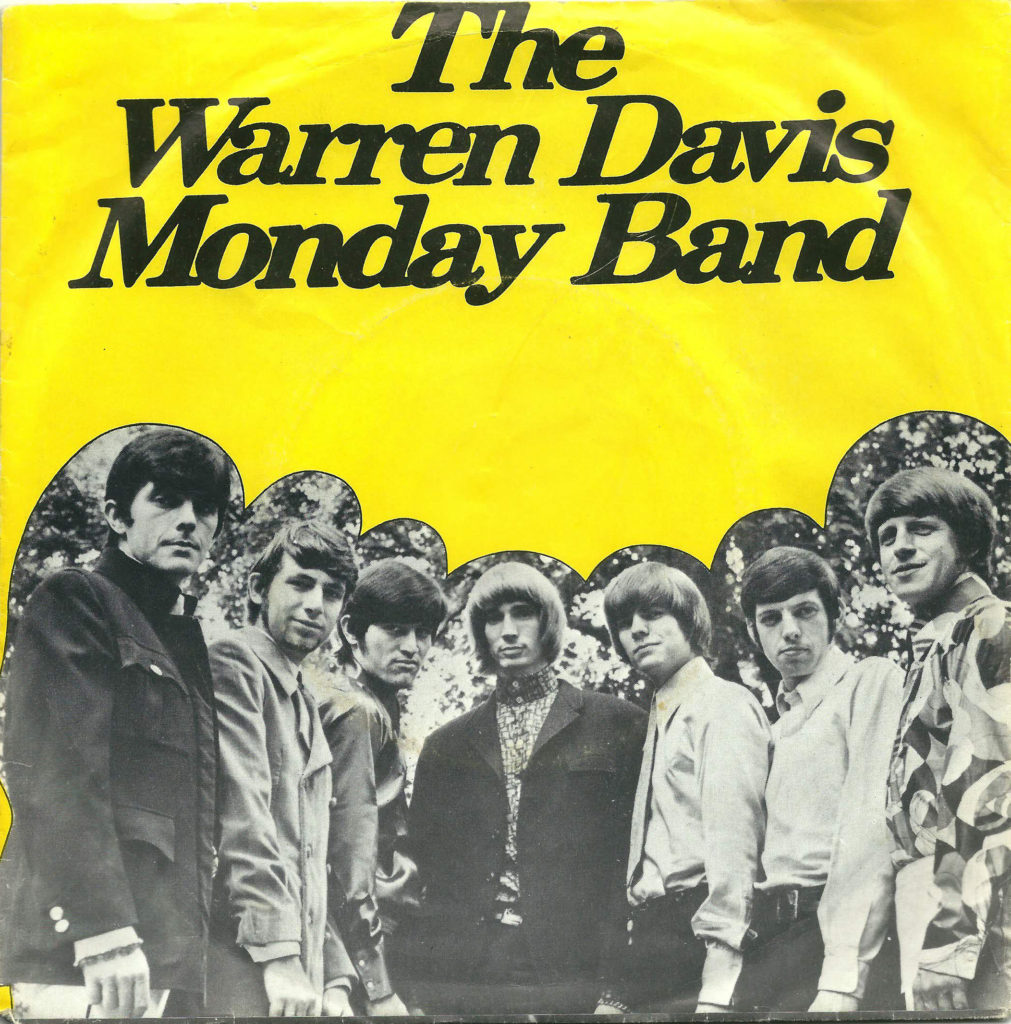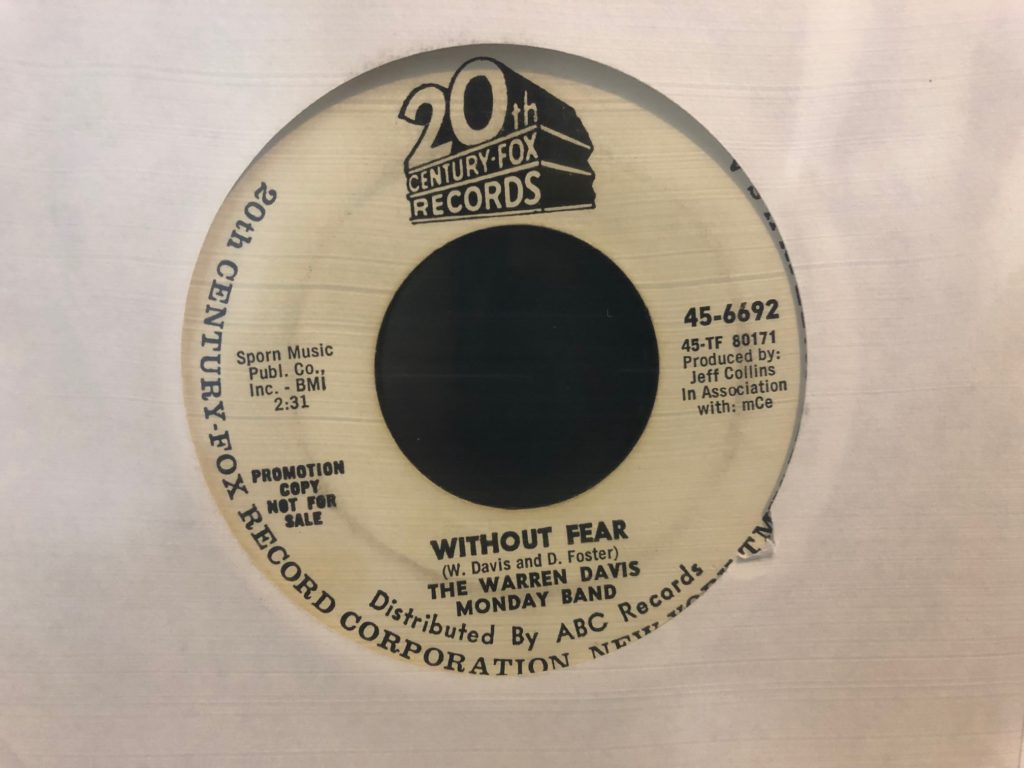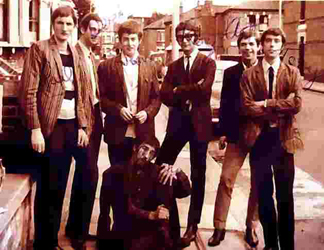By Nick Warburton
During The Warren Davis Monday Band’s short-lived career, the group were briefly associated with Rolling Stone Bill Wyman, who produced and co-wrote the A-side of their debut 45; were raved about by Hammond organist Booker T, who caught them one night in London during the spring ’67 Stax-Volt European tour; briefly included future Canadian rock legend, musician, record producer, composer, songwriter and arranger David Foster; and were the subject of a disastrous tabloid story, which reported they had signed a £500,000 contract with 20th Century Fox to make a TV series in California to compete with The Monkees.
Warren Davis Monday Band, Summer 67, left to right: Martin Grice, Del Paramor, Warren Davis, Peter Mole, David Foster, Bruce Usherwood and Mick Patel. Photo: Bruce Usherwood
The one consistent thread throughout The Warren Davis Monday Band’s fascinating, yet tangled, career was former actor/model, turned singer Max Spinks (aka Warren Davis). It is his distinctive voice that links the dozen or so recordings that feature on a forthcoming CD anthology from US collectors’ label Lion Productions, which brings together pretty much everything the group cut between late 1966 and early 1968.
In early June 1967, shortly after original guitarist Rob Walker had bowed out a second time (subbing for his brief replacement Welsh guitar legend Dave Edmunds), keyboard player Andy Wilson and sax player Paul Houlton both quit, the latter to join Pete Gosling’s Moon’s Train, taking over from Ken Leamon, forcing Warren Davis to revamp the band.
“The reason why I left is, musically, I didn’t find it terribly interesting,” admits Houlton. “For me, it wasn’t a very happy band. Spinks did all the hustling [for gigs] and kept very tight control of the money; I don’t think we got as much as we should have got. But then again, he did all the hustling, so he probably deserved extra money. I was very pleased to leave him to be honest.”
Rob Walker admits he too had good reasons to hand in his notice: “There were better bands around playing the same kind of stuff that we were. Not that it was what prompted me as I had had enough of the band anyway,” he says.
“But Dave Edmunds turned up and he was like head and shoulders above anyone else in the band, including me. Also, we brought out ‘Wait for Me’ in the same week as Procol Harum brought out ‘A Whiter Shade of Pale’ and I remember being round at Matthew Fisher’s house and wondering which of whom might get into the hit parade. I could see obvious reasons, that Dave Edmunds and Procol Harum had the talent to make it in the music business whereas The Warren Davis Monday Band would have to rely on a lot of luck to be successful.”
Stepping into Wilson’s shoes was a very young Canadian Hammond organist named David Foster, who’d arrived in England in early October 1966 with an outfit from Victoria, Vancouver Island, called Bobby Faulds and The Strangers. The group had already achieved notable success back home in British Columbia. English-born drummer Barry Casson had made an earlier trip to London and had seen an opportunity for the Canadian group to land work in England and encouraged the others to relocate.
Renamed The Canadians, the musicians signed up with the Roy Tempest Agency and worked under their own name as well as backing visiting US soul and blues acts, The Drifters, Chuck Berry, Inez and Charlie Foxx and Bo Diddley from December 1966 to April 1967.
Foster brought with him a talented British lead guitarist who could also play a bit of sax – Mick Patel (also known as Mick Platel). The pair had briefly worked together in The Canadians’ dying days on a short trip to Cologne in West Germany where the band played a monthly residency at one of the city’s clubs.
Mick Patel, David Foster and Barry Casson with The Canadians in Spring 1967. Photo: Barry Casson
Patel, originally from southeast London, had first come to prominence in 1965 as a member of The Charmers, who backed up and recorded tracks with Jamaican-born singer Carl Douglas (of “Kung Fu Fighter” fame); all of which have been picked up by Acid Jazz Records in the UK for the Carl Douglas compilation LP Crazy Feeling.
Carl Douglas and The Charmers (from left to right: Carl Douglas, Nick Baxter, Lee Hall, Mick Patel, Tony Charman). Photo: Tony Charman
Later, in 1966, Mick Patel joined local rivals The Loose Ends. The guitarist/sax player joined after the group had released two singles on Decca Records but in time for a residency at the Bang Bang club in Milan in January 1967.
The Loose Ends, Milan, 1967, from left to right: Tony Glyde (drums), Colin King (guitar), Bob Saker (vocals), Mick Patel (sax) and Colin Pullen (bass). Alan Marshall and Phil Lanzon (not pictured). Photo: Colin Pullen
In an interesting side note, Otis Redding had caught The Loose Ends in action on their return, playing at trendy London nightclub spot, the Scotch of St James, on the same Stax-Volt tour that Booker T & The MGs were on (see part 1). Impressed by singers Alan Marshall and Bob Saker, Redding took them back to the US that May to record at Fame Studios, inadvertently leaving the remaining members at a loose end (no pun intended). While most became singer Kenny Barnard’s new band, Cats Pyjamas, Patel hooked up with The Canadians.
“I think it was Mick [Patel] that brought me to the audition with Warren Davis,” says David Foster looking back. “I was only 17 at the time and it was a pretty brief stint, maybe two or three months.”
“I was so thrilled to get that gig,” he adds. “London was a terrible time for me because I went so long without getting any work. I was classically trained, and I didn’t really fit in anywhere.”
Soon after Foster and Patel’s arrival, The Warren Davis Monday Band ventured outside London and played two shows opening for US soul legend Edwin Starr before resuming their regular spot at the Upper Cut in Forest Gate. On one occasion, they opened for Steve Marriott and Ronnie Lane’s band, The Small Faces.
A few weeks later, the band auditioned tenor sax player Derek “Del” Paramor from Gravesend in Kent at the club. Paramor had recently been playing with singer Vince Edwards after a longer stretch backing future British pop icon David Essex in the group Mood Indigo. The sax player made his band debut at the Upper Cut on 15 July 1967.
Mood Indigo, Spring 1967, Del Paramor far right. From: Del Paramor
Del Paramor remembers that on another occasion, the group rehearsed on the club’s stage from 11am through to 4am the following morning.
“We all slept backstage, wrapping ourselves up in some curtains we found,” he recalls. “We had been trying to copy two songs from Georgie Fame’s LP Sweet Things, which we subsequently played as part of our act: “Sitting in the Park” and “Funny How Times Slips on Right Away”.
The new recruit also remembers working up renditions of “Respect”, “Barefooting”, “Papa’s Got a Brand New Bag” and even Lee Morgan’s jazz number “Sidewinder”.
It was also Paramor who introduced the band to wheelchair bound Barry Collings, who ran his own agency and had found some gigs for Mood Indigo. Collings came to the rescue when The Warren Davis Monday Band needed help securing more work.
The Warren Davis Monday Band, July 1967. From: Bruce Usherwood
By mid-July, Columbia Records had shipped the group’s debut release – “Wait for Me” backed by “I Don’t Wanna Hurt You” – but as would become a pattern in the band’s career, the line-up that entered the studio to cut tracks had changed radically by the time the same recordings were released as a single.
The new formation was a formidable one, however. Still in his late teens, David Foster’s virtuosity on the keyboards was undeniable as was the creative weight he brought as a writer and arranger.
On 2 August, Jeff Collins brought the musicians into Regent Sound to record material for a second single for the label. The A-side was an ambitious, albeit commercial reading of the Raleigh/Linden co-production, “Love Is a Hurtin’ Thing”, a recent US hit for soul singer Lou Rawls.
The Warren Davis Monday Band’s version is a pop classic, which opens with a powerful sweeping Hammond organ solo from David Foster. Commercial credentials aside, the recording is, at least in this writer’s opinion, superior to Rawls’s cover and should have been a monster UK hit.
The B-side, the Warren Davis and David Foster co-production, “Without Fear”, is also impressive. Listening to the recording today, it’s incredible to think that Foster was only 17 years’ old at the time he co-penned the track.
“I remember being so excited that I was in the studio,” remembers David Foster. “Already at that age, it was something I knew I wanted to do. I was just stoked that I was with a band that had the wherewithal and the means to go in and make a record. I hadn’t made any records before that other than in my hometown Victoria. The Warren Davis Monday Band was my first shot at really trying to write a song.”
The US market obviously saw the potential in the recording, with 20th Century Fox pairing “Without Fear” with The Boardwalkers’ earlier demo “Any Man’s Girl” for a lone single release. But with no US promotion to back it and the group complete unknowns Stateside, it was never going to break the Billboard charts.
Jeff Collins recalls that he had sent a promo of the latest Columbia single to record companies in the States and received a call from one gentlemen who told him that the A&R team at 20th Century Fox were interested in releasing a Warren Davis Monday Band single.
“I sent him some of their latest recordings and they jumped on it,” he says. “Sad to say, we never received any royalties from it, although I understand it received many radio plays across the States.”
Less than a week after cutting the tracks in London, Jeff Collins sent the band on a short, week-long Italian tour, which involved driving down to a US NATO base in Naples.
“At the time, I had a Lotus Cortina Mark 1 and I drove it the whole way with Mick Patel and David Foster,” remembers Bruce Usherwood. “The rest went in the van with the gear.”
“We went out there with a contract with [our manager] Jeff Collins and when we got there nobody knew anything about it,” adds Del Paramor. “The chap that Jeff Collins had made the contract with was called Stan Beiderbeck and [unbeknown to us] there had been a dispute between them”.
As things turned out, the musicians only managed to play a few times, scraping together enough to cover the cost for the return journey.
“The base was full of Americans,” continues Bruce Usherwood. “They were nice guys. They said, ‘Look, we can give you somewhere to stay and we’ll feed you, but we can’t pay you. If you’re ready to play for us, we’ll call it quits’, so that’s what we did.”
Paramor remembers that Collins was very apologetic about the entire episode and took the musicians out for a meal at a posh restaurant in Soho when they got back.
However, the Italian trip proved a turning point. After playing a double-nighter in London’s West End – the Whisky A Go Go and Roaring ‘20s on Carnaby Street on 28 August, Bruce Usherwood was sacked. Dispirited, David Foster and Mick Patel bailed out.
David Foster would return to Vancouver soon after, taking Mick Patel with him, but not before turning down an offer to join Cat Stevens’ backing band. The pair put a short-lived group together in Vancouver, but it didn’t last long.
While Mick Patel has since seemed to have disappeared from the scene, David Foster of course became a huge star after moving to the United States in the 1970s. The sixteen-times Grammy award winner has worked with Earth, Wind and Fire, Chicago, Peter Cetera, Chaka Khan, Whitney Houston, (he produced the music for the film, The Bodyguard), Donna Summer, Madonna, Michael Jackson and Barbra Streisand, to name only a few.
Looking back on Foster’s short tenure with the group, Paramor remembers that at one point, “David wanted to take the whole band back to Canada”, adding, “wisely we declined”.
As for Bruce Usherwood, he later played with Croydon outfit The Front Line Band with singer Patrick Dane and currently resides in southwest France.
Incredibly, The Warren Davis Monday Band regrouped within a week or so, bringing in the late Keith Beck (real name: Keith Burberry) to fill the gaping hole left by David Foster. Hailing from Norwich, Beck, who’d previously also worked under the stage names Keith Berry and Dave Burberry, had played with local bands The Cheaters and Feel for Soul.
On a creative level, however, the band arguably stepped up a gear with the addition of lead guitarist/singer Paul Brett and bass player/singer Paul Petts, who’d been working together since late 1966 with former chart toppers The Overlanders (future Sweet producer Phil Wainman was the drummer briefly in spring 1967). Both were ambitious songwriters who would provide the bulk of the original material that the new formation would perform and record over the months ahead.
The Overlanders, late 1966, featuring Paul Brett (left) and Paul Petts (second left). Photo: Paul Brett
While Petts had previously plugged away on the local Canterbury scene with The Swinging Secrets and The Countdowns prior to joining The Overlanders, Brett had an impressive CV.
Originally from Fulham, southwest London, Brett had first come to prominence when he replaced Jimmy Page as guitarist with Neil Christian and The Crusaders during early 1963. He then worked briefly with the blues outfit South West Five featuring future Blonde on Blonde guitarist Ralph Denyer.
After that, he worked for nearly a year with the future “God of Hellfire” Arthur Brown in Arthur Brown and The Swinging Machine and The Arthur Brown Union. In a case of serendipity, the drummer in Brown’s bands, Jim Toomey, would also join The Warren Davis Monday Band, but in spring 1968, a few months after Brett had moved on.
The Arthur Brown Union from late 1965 featuring Paul Brett (far left) and Jim Toomey (third left, above Arthur). Photo: Art Regis
While working with The Overlanders in late 1966/early 1967, Paul Brett recalls participating in an early Crazy World of Arthur Brown session with drummer Jon Hiseman, bass player Ronnie Wood and Hammond organist Vincent Crane where the musicians cut “Devil’s Grip”. Paul Petts recalls another Arthur Brown session around this time where he supplied bass on the track. Paul Brett and Vincent Crane were also at the session.
The new-look Warren Davis Monday Band began to expand its horizons, both musically and geographically. For the first time, the band started to gig extensively beyond London and the surrounding counties.
Even so, one of the group’s notable gigs, on 10 October, was opening the Staircase nightclub in Soho where singer/songwriter Cat Stevens appeared as guest of honour.
To be continued…
Thanks to Del Paramor, Bruce Usherwood, Rob Walker, Martin Grice, Paul Houlton, Jeff Collins, David Foster, Paul Brett, Paul Petts, Jacomine Mole and Annette Arber.
